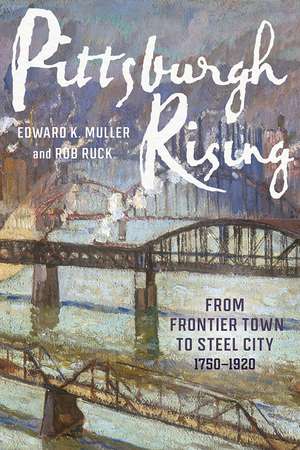Pittsburgh Rising: From Frontier Town to Steel City, 1750-1920
Autor Edward K. Muller, Rob Rucken Limba Engleză Hardback – 15 mai 2023
Preț: 164.64 lei
Nou
Puncte Express: 247
Preț estimativ în valută:
31.51€ • 32.84$ • 26.23£
31.51€ • 32.84$ • 26.23£
Carte disponibilă
Livrare economică 14-28 decembrie
Preluare comenzi: 021 569.72.76
Specificații
ISBN-13: 9780822947721
ISBN-10: 0822947722
Pagini: 296
Dimensiuni: 152 x 229 x 33 mm
Greutate: 0.7 kg
Editura: University of Pittsburgh Press
Colecția University of Pittsburgh Press
ISBN-10: 0822947722
Pagini: 296
Dimensiuni: 152 x 229 x 33 mm
Greutate: 0.7 kg
Editura: University of Pittsburgh Press
Colecția University of Pittsburgh Press
Recenzii
"Muller and Ruck detail how tycoons like Carnegie, Frick and Mellon built their empires, even as they emphasize the brutal exploitation of the largely immigrant workforce that made those fortunes possible — and the ethnic social clubs and other organizations that helped those workers and their families survive. Still, the authors pay heed to underrepresented aspects of local history."--Bill O'Driscoll, WESA FM
“Muller and Ruck do a fantastic job of giving a sense of what the actual conditions were like in the iron forges, steel mills, and glass workshops of Pittsburgh. The day-to-day specifics of labor are conveyed with ease and accessibility. They extend this focus to the capital class as well, explaining the economics and technology that altered industrial production, as well as the personalities of men like Carnegie, Frick, Westinghouse, and Heinz, who changed the city forever. In addition to that familiar story, they add nuance to the narrative of immigration to Pittsburgh, both from Europe and in the form of Black migration from the South, by emphasizing the ways in which regionalism from country of origin affected the American experience of different groups.” —Ed Simon, author of An Alternative History of Pittsburgh
“In its first 150 years, Pittsburgh was a place shaped by geography, natural resources, immigration, class and ethnic identity, and the quest for power and profit. This is a history of the people who fashioned lives in Pittsburgh and the material and social structures in which they lived those lives. Muller and Ruck offer a masterful sense of cause and effect, leading the reader into a sense of change over time. They present the messy limitations and possibilities of Pittsburghers’ lives.” —Edward Slavishak, Susquehanna University
“Muller and Ruck do a fantastic job of giving a sense of what the actual conditions were like in the iron forges, steel mills, and glass workshops of Pittsburgh. The day-to-day specifics of labor are conveyed with ease and accessibility. They extend this focus to the capital class as well, explaining the economics and technology that altered industrial production, as well as the personalities of men like Carnegie, Frick, Westinghouse, and Heinz, who changed the city forever. In addition to that familiar story, they add nuance to the narrative of immigration to Pittsburgh, both from Europe and in the form of Black migration from the South, by emphasizing the ways in which regionalism from country of origin affected the American experience of different groups.” —Ed Simon, author of An Alternative History of Pittsburgh
“In its first 150 years, Pittsburgh was a place shaped by geography, natural resources, immigration, class and ethnic identity, and the quest for power and profit. This is a history of the people who fashioned lives in Pittsburgh and the material and social structures in which they lived those lives. Muller and Ruck offer a masterful sense of cause and effect, leading the reader into a sense of change over time. They present the messy limitations and possibilities of Pittsburghers’ lives.” —Edward Slavishak, Susquehanna University
Notă biografică
Edward K. Muller is professor emeritus of history at the University of Pittsburgh and former director of the university’s Urban Studies Program. He focuses on the history and geography of North American cities, particularly Pittsburgh. He is coauthor of Making Industrial Pittsburgh: Environment, Landscape, Transportation, Energy, and Planning and Before Renaissance: Planning in Pittsburgh, 1889–1943, among other books, and editor of An Uncommon Passage: Traveling through History on the Great Allegheny Passage Trail and DeVoto’s West: History, Conservation, and the Public Good, among other books.
Rob Ruck is a historian at the University of Pittsburgh, where he teaches and writes about sport. He focuses on how people use sport to tell a collective story about who they are to themselves and the world. He is the author of Tropic of Football: The Long and Perilous Journey of Samoans to the NFL, Raceball: How the Major Leagues Colonized the Black and Latin Game, and Rooney: A Sporting Life, among other titles. His documentaries Kings on the Hill: Baseball’s Forgotten Men and The Republic of Baseball: Dominican Giants of the American Game appeared on PBS.
Rob Ruck is a historian at the University of Pittsburgh, where he teaches and writes about sport. He focuses on how people use sport to tell a collective story about who they are to themselves and the world. He is the author of Tropic of Football: The Long and Perilous Journey of Samoans to the NFL, Raceball: How the Major Leagues Colonized the Black and Latin Game, and Rooney: A Sporting Life, among other titles. His documentaries Kings on the Hill: Baseball’s Forgotten Men and The Republic of Baseball: Dominican Giants of the American Game appeared on PBS.
